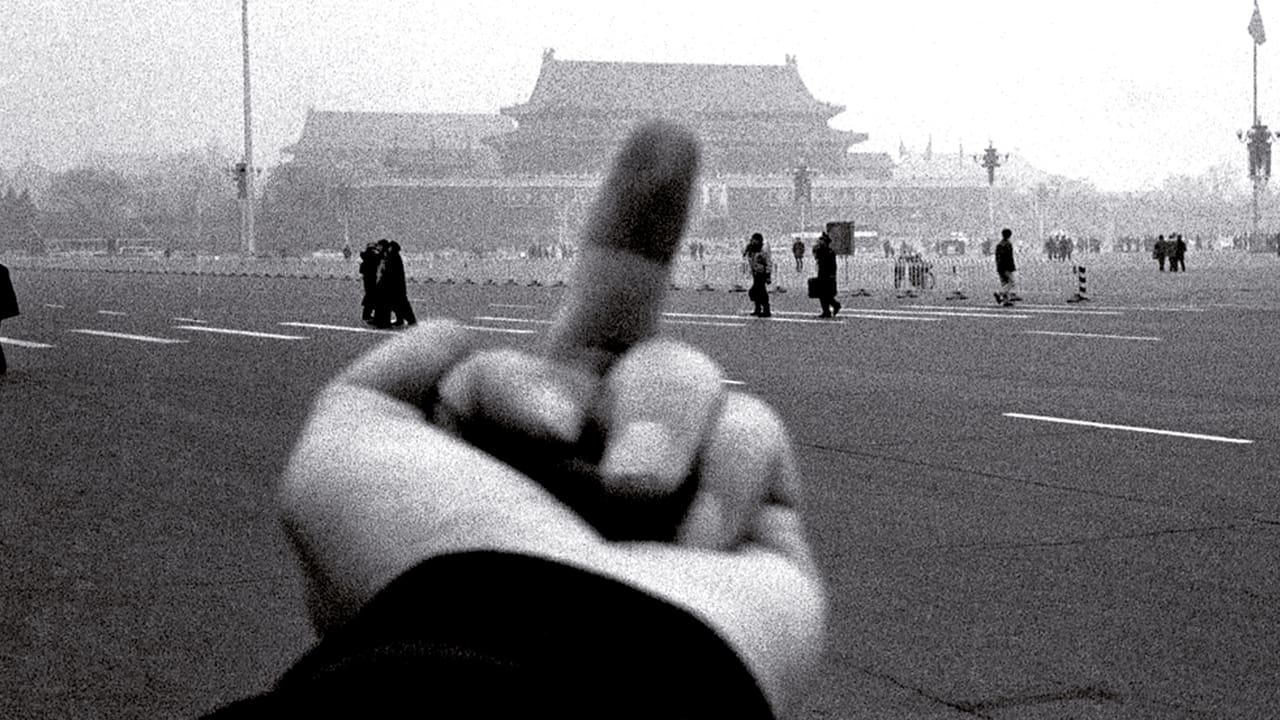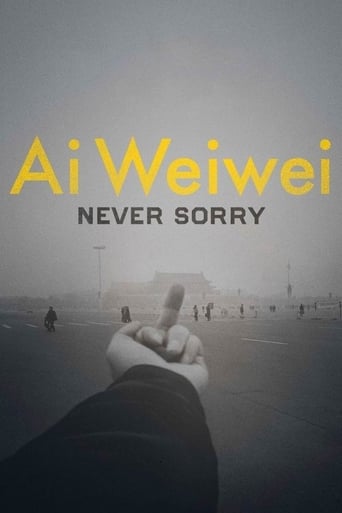EssenceStory
Well Deserved Praise
Nonureva
Really Surprised!
BroadcastChic
Excellent, a Must See
Livestonth
I am only giving this movie a 1 for the great cast, though I can't imagine what any of them were thinking. This movie was horrible
politic1983
Ai Weiwei isn't just a hilarious name to say to any Englishman but also a name associated with freedom of speech in modern day China. An artist by trade, Mr Weiwei is now more (in)famous for saying 'fuck you' to the Chinese Government than putting any brush strokes to canvas.'Never Sorry' is the documentary from debut director Alison Klayman resulting from her four years following China's most famous artist as he travels around China and the world causing further and further headaches for local police and the Chinese Government. Concentrating as much on political acts than artistic ones, the film shows the importance of Twitter and social media in a country such as China, showing as many of his status updates throughout the film as Richard Herring will commit in a 90 minute period. The balance between politics and art is well maintained throughout, reminding that he has actually done some good works over the years - as well as breaking some old pots - while showing the political motivations in his work through interviews with various peers and colleagues over the last three decades.But saying 'fuck you' and breaking some vase-thing doesn't come without its fair share of problems. Various confrontations with police, sometimes violent, are shown, as well as his non-mysterious disappearance in 2011 and the momentary stem in the flow of his freedom of speech. The documentary is more about freedom of speech than a biopic of an artist, using him as an example of the impact of social networking, as well as what happens when the rules are broken.There are some weak points, such as the mystery around his son with a woman that isn't his wife – a topic that his wife is not questioned on and which he is coy – that is only mentioned and not explored; and his confrontation with police while sticking cameras in their faces probably provokes a response from law enforcement that would be met in most nations in the world. As noted, the fact that someone like Ai Weiwei exists shows that there has been some change in China over the years, though the fact that his words are met with such strong response from the Government shows that there is still a long way to go before China becomes a nation where people can freely express their opinions to the world on Twitter without fear of arrest and prosecution – unless, of course, you're a Premiership footballer.www.politic1983.blogspot.com
evening1
Powerful documentary about a brave and provocative man who travels with a camera crew as they challenge the Chinese government.Ai Wei Wei, seemingly the only man in China who wears a beard, seems an artist of considerable talent. But he directs his greatest energies toward criticizing and questioning a regime that returns the attention with monitoring, harassment, and abuse. Ai has become a lightening rod for controversy since he started asking about a recent earthquake in Sichuan that killed 5,000 children when their schools collapsed.Strangely, this film doesn't mention why Ai would hold the government responsible for a natural disaster. But I have learned elsewhere (see my review of "China's Unnatural Disaster: The Tears of Sichuan Province") that the quake destroyed schools, leaving other buildings intact, arousing suspicion that corruption allowed for shoddy "tofu-like" construction. Ai has rightly asked officialdom why it doesn't investigate the tragedy.The film documents a stunning tribute to the child victims in an art show mounted in Germany that creates a message in Chinese characters from 5,000 multicolored backpacks. Yet the filmmakers never tell us what the characters mean! Additional footage is devoted to a bizarre work installed at London's Tate Modern in which 100 million lacquered sunflower seeds are raked out in a giant frame, for viewers to tread and sit on as they please. This odd work's significance from Ai's perspective isn't explored at all.This film includes much disturbing footage of Chinese police and military personnel harassing Ai, allowing him to build a studio and then tearing it down, and at one point clobbering him on the head in an attack that requires brain surgery. It documents Ai's abortive efforts to file a police report and lawsuit. The Chinese government comes off looking bad as people in the street obviously recognize the artist -- a tireless poster on Twitter -- and seem to encourage his efforts.Ai is a man of few words who speaks in simple terms, yet his statements often resonate. A burly person who is often filmed at table, he patiently answers questions about having fathered a child out of wedlock, a young boy who never says anything on camera and is often seen handing Ai things to eat.Near the end of the film, we learn through titles that Ai disappeared in 2011. The words come as a blow because by the time they appear the viewer has bonded with the activist. As I had taped this film, I rushed to Wikipedia to discover Ai's fate.As the film points out toward its end, Ai was arrested and detained for several months, then finally released with restrictions on his ability to speak to the media and travel abroad. We see startling scenes of a seemingly chastened Ai declining to speak to the press. However, we're told as the film draws to a close that Ai has gone on to resume his Twitter efforts. Phew! (Whether he's allowed to leave the country remains unclear.)This documentary spends some time noting that Ai's fame offers him some amount of protection. But how much, exactly? He's had his head pummeled, his studio demolished, and his freedom seized. One wonders what's next but hopes for the best.This film is best for making the world aware of an intriguing and important public figure. He deserves our attention and protection.
Larry Silverstein
I must admit I knew virtually nothing about the Chinese dissident and artist Ai Weiwei before his detention and disappearance, in 2011, which made world headlines. This documentary, directed by Alison Klayman, does a fine job of capturing the life of Weiwei, who I found to be a very brave and charismatic figure. The film, I thought, was quite inspiring to me and also quite fascinating.The opening scenes show one of Weiwei's cats, who has learned to jump high and put his weight on a door handle and open the door, which is pretty amazing. Then Weiwei in his sly humor states that cats are different than humans because they have no inclination to close a door after they've opened it.His father was a renowned poet in China, but was sent into exile for re-education for 19 years. I imagine this is where Weiwei's iconoclastic spirit began. The movie traces his 12 years in New York City, where his brilliant art conceptions took root. When the crackdown in Tiananmen Square took place, in 1989, Weiwei participated in hunger strikes and demonstrations in protest. In 1993, he returned to China to be with his ailing father, who eventually passed away three years later.Most of the documentary focuses on Weiwei's continuing struggles to achieve more freedom for the Chinese people in a very authoritarian and controlled society. He seems to be in a continual struggle with the government, which shut his blog, surveilled his comings and goings, and even did nothing when security guards beat him in a hotel room, causing his brain to swell, nearly killing him.When the Sichuan earthquake struck China there were over 5,000 children killed, mostly from poor construction of schools, per the film. While the government wanted to keep the names of those who died secret, Weiwei began to identify all the children who died and had people from around the world read one name of each child on his Twitter page, to the consternation of the Chinese government.While some of his compatriots were imprisoned for speaking out against the authorities, such as Liu Xiaobo, Weiwei had escaped that fate. Many felt this was due to his worldwide notoriety, with his shows being so popular in many countries. However, in 2011, he was detained and for nine months held in seclusion. He was eventually released and apparently has slowly resumed his actions to achieve more freedom for the people there.The movie, I thought, was quite inspiring to me, and I found Weiwei's calm but revolutionary spirit to be quite special. The film also gives the viewers a seldom seen inside look at what's going on in China today.
samuelfitlee
This documentary covered a serious look in various aspects on the Chinese artist/ activist, Ai Wei Wei. He was quite famous even before his 2008 Beijing Olympic main structure, Bird Nest. The shooting style was rather straight forward. As a documentary, the most important thing is the subject of the documentary. Definitely, Ai Wei Wei was an interesting subject that does not require a lot of enhancement work in other areas. The documentary was very rich with interview like local culture blogger, colleague, friend, wife, son's mother, mother and himself. More importantly, couple events like following up with the assault cases in very tense situation does capture attention because it is real event with some hidden camera. In one of his art, he dropped a two thousand year old Han Dynasty Chinese urn and toke picture of it. At first, people might though he was an insane post-modern artist who was acting weird with his new age behavior art. He also painted over those antique urns with funky bright yellow and blue color. It may be a heartbroken experience for those antique lovers. Later, he explained the city of Beijing was just like those Han's urns. The city was torn down for new development. That was of power of his art which making strong statement and interesting parable. His expression echoed the prophet in the Bible like Prophet Nathan. Prophet Nathan told a story of how a greedy rich man ripping of the poor to King David. King David was very upset of this story. But, Prophet Nathan later pointed out that King David actually was the one who ripped off the poor by taking someone wife and murdered her husband. Both of Ai Wei Wei and Prophet Nathan had the power of using parable to have a sneak behind attack before the defense system was setup.

